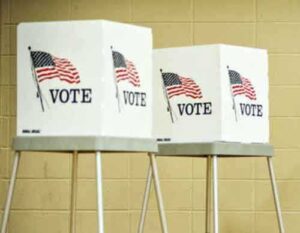 JUNEAU, AK (August 3, 2023) – The Central Council of the Tlingit and Haida Indian Tribes of Alaska’s (Tlingit & Haida) Executive Council voted yesterday to unanimously support the Frank Harrison, Elizabeth Peratrovich, and Miguel Trujillo Native American Voting Rights Act.
JUNEAU, AK (August 3, 2023) – The Central Council of the Tlingit and Haida Indian Tribes of Alaska’s (Tlingit & Haida) Executive Council voted yesterday to unanimously support the Frank Harrison, Elizabeth Peratrovich, and Miguel Trujillo Native American Voting Rights Act.
The bi-partisan legislation has been brought forward in every Congress since 2019 and makes significant steps toward achieving equitable access the ballot box for Alaska Native and American Indian voters.
The related Senate and House bills are sponsored by U.S. Senator Ben Ray Luján (D-New Mexico) and U.S. Representative Sharice Davids (D-Kansas, member of the Ho-Chunk Nation).
“Indigenous voters continue to face voting challenges at every turn when attempting to make their voices heard at the ballot box,” said President Richard Chalyee Éesh Peterson. “Some Indigenous voters living in rural communities and on reservations need to use ballot collection services due to limited access to home mail services and polling places. Every member of Congress needs to honor the United States’ trust responsibility to tribes and their inherent sovereignty under the law.”
In 1924, Congress passed the Indian Citizenship Act, which was supposed to grant Alaska Native and American Indian people the legal voting rights on par with all U.S. citizens. Even with the passage of this bill, Indigenous people were still prevented from participating in elections because the U.S. Constitution left it up to the states to decide who has the right to vote.
Some states chose to continue disenfranchising Indigenous people, like the Alaska Territorial Legislature which passed the Alaska Voters Literacy Act in 1925 requiring voters to speak and read English and subsequently excluded non-English-speaking Alaska Natives.
It wasn’t until 1945 that Alaska’s legislature would take steps toward ending voter discrimination when it passed the Alaska Equal Rights Act of 1945, largely due to Alaska Native civil right leader Elizabeth Peratrovich.
“This crucial legislation stands on its own but is especially important as we approach the 100th anniversary of the Indian Citizenship Act,” said President Peterson. “Indigenous voters have had to fight to use their right to vote since the act was passed. Congress must advance legislative solutions to remove barriers and this bill does just that.”
Important components of the bill would require election officials to accept tribal identification cards as valid forms of identification for the purposes of voting or registering to vote in an election for federal office. It also would require states and local precincts to provide at least one early voting, ballot drop box and polling location per precinct on tribal lands, including Alaska Native Claims Settlement Act (ANCSA) or village corporation lands and any tribal statistical areas, and require prior notice and consent before states and precincts remove or reduce voting locations on tribal lands.
If passed, the legislation would also create a $10 million U.S. Department of Justice (DOJ) grant program to establish a Native American Voting Rights Task Force in states to facilitate collaboration between tribes and election officials, direct the Office of the Attorney General to conduct a study on non-traditional and non-existent mailing addresses among tribal citizens and identify alternatives to remove barriers to voting, and require the United States Postal Service and the DOJ to consult with tribes annually on addressing any issues that present barriers to voting for eligible Native voters.
